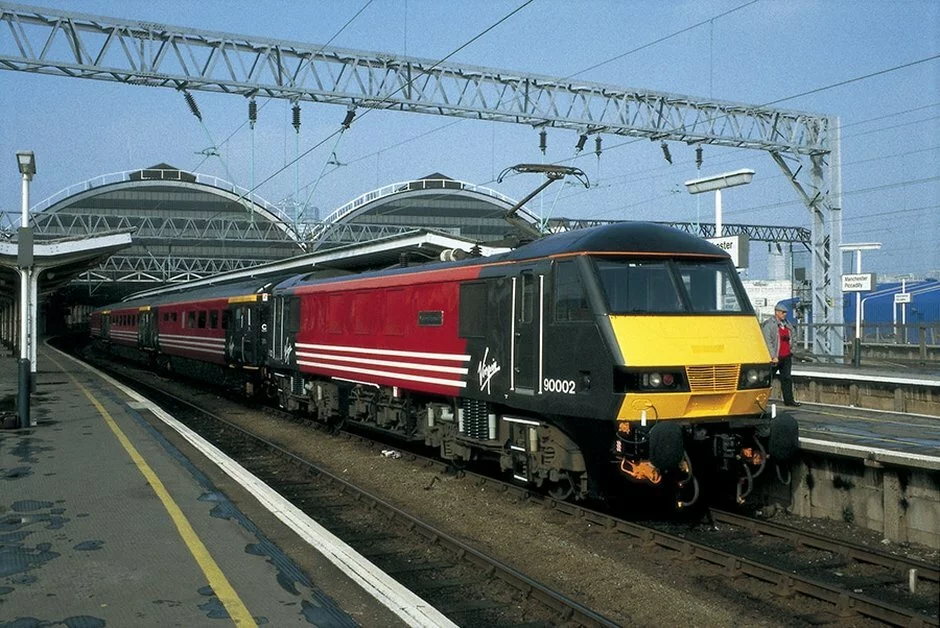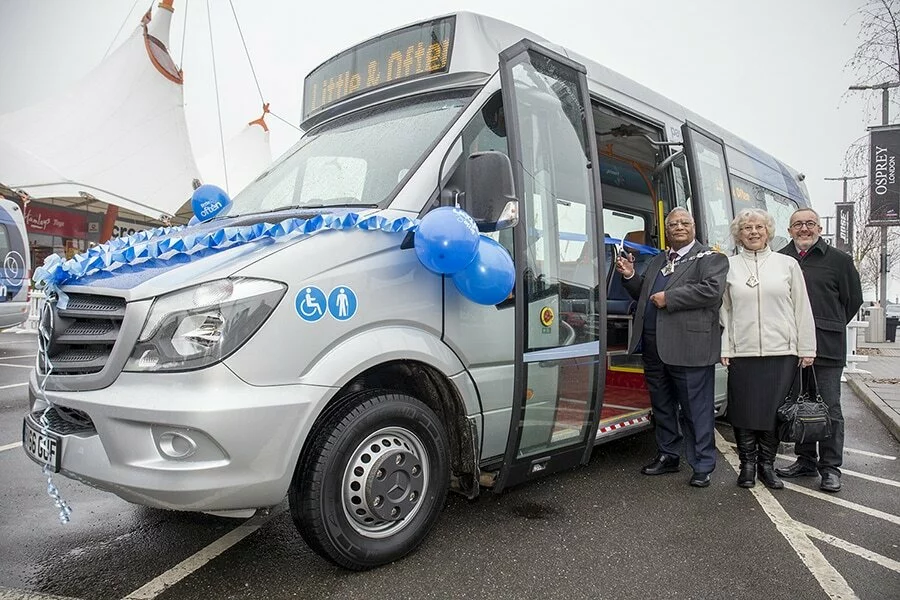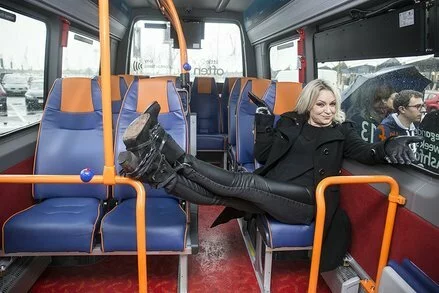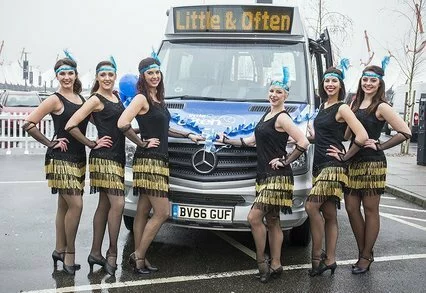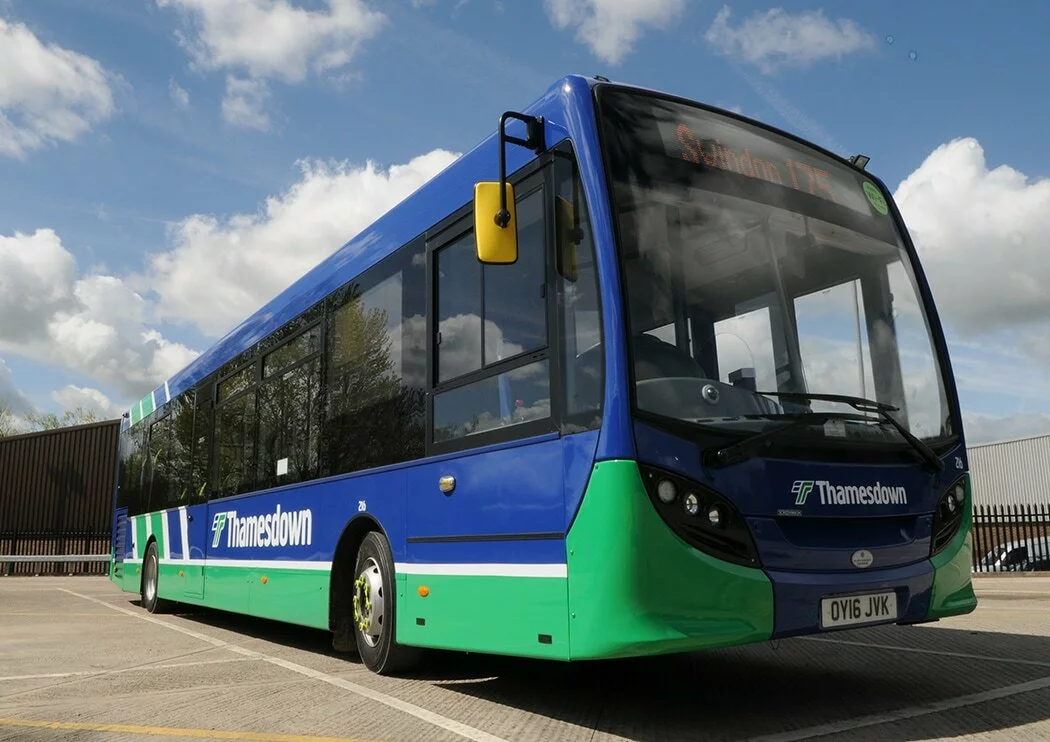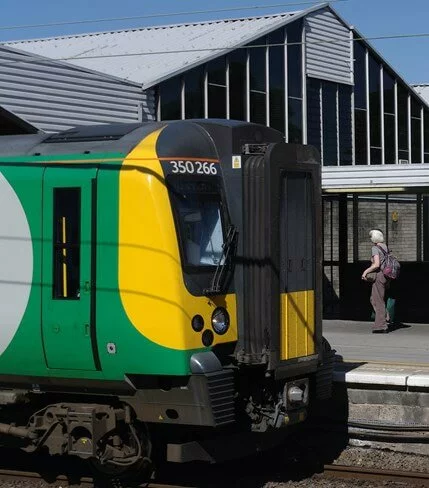- Home Page
- Fleet News Ramblings
- SKM News Views & Blog
- Behind The Picture
- Contact us
Virgin (West Coast) launches 20th Birthday Seat Sale with up to 55% slashed from some advance fates28/2/2017 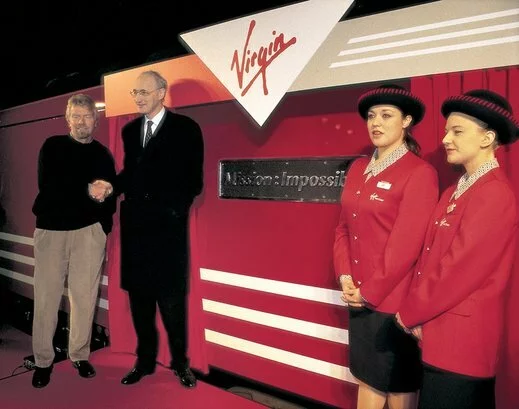
Virgin Trains, those that operate on the West Coast, can be a strange beast. There are times when its top brass wants to eliminate its past, whilst at other times it wants to celebrate.
True, times have been tough. But just lets reflect. Twenty years operating a rail franchise is a long time in rail privatisation. Yes, I did say 20 years as it was at 02:00 on March 9th 1997 that Virgin took charge of its second rail franchise - it already had CrossCountry, but as history records it lost that one in 2007. And for its 20th Birthday, Virgin wants to celebrate. Back in 1997 Virgin Group funded its rail franchise activity through Investment Banks. When CrossCountry and West Coast were awarded Virgin only had a 41% share in Virgin Rail Group - the remaining 59% was held by Electra Fleming, JP Morgan, Bankers Trust and Texas Pacific Group, which was a start-up short term investment. After the award of West Coast there were several options explored in relation to a re-financing package. I believe that at one stage a Stock Market flotation was the preferred option. However, a deal was struck in June 1998 with Stagecoach (and agreed with OPRAF) which provided the finds to repay the Investment Bankers whilst also allowing Virgin to increase its share in Virgin Rail Group by 10%, taking it from 41% to 51%. The launch was accompanied by the release of cheaper advance fares on some routes, so it is great to see Virgin offering some heavily discounted advance fares as part of 20th Birthday Seat Sale. Itis launching a record six-day online 20th Birthday Seat Sale, to thank customers for twenty years of travelling with Virgin Trains on the West Coast. From its birthday on Thursday 9 March to Tuesday 14 March, prices will be slashed on Standard and First Class fares on the Virgin Trains West Coast route. Passengers booking in advance to travel on Virgin Trains to West Coast destinations including Manchester, Liverpool and Glasgow can save up to 55% for travel between Saturday 25 March and Thursday 24 August 2017. Discounted Standard fares include the below Advance Single tickets*: London to Manchester: before £22, now £10 London to Birmingham: before £8, now £4 London to Chester: before £16.50, now £10 London to Glasgow: before £30, now £14 Discounted First Class fares include the below Advance Single tickets*: London to Manchester: before £43, now £28 London to Birmingham: before £26, now £17 London to Chester: before £45, now £28 London to Glasgow: before £55, now £35 Phil Whittingham, MD for Virgin Trains on the West Coast, said: “What better way to celebrate 20 years of Virgin Trains than with our longest ever seat sale. From introducing the iconic Pendolino train and doubling passenger numbers, through to ground-breaking firsts like Automatic Delay Repay and our entertainment system BEAM, we’re proud of the impact we’ve had on UK rail travel. So we’ve knocked up to 55% off nearly one and a half million tickets, as we say thank you to our customers - we couldn’t have done it without you!” Discounted tickets will be available to book at www.virgintrains.co.uk from 00:01 on Thursday 9 March. Stagecoach South East says ‘Little & Often’ is just the tonic for Ashford15/2/2017 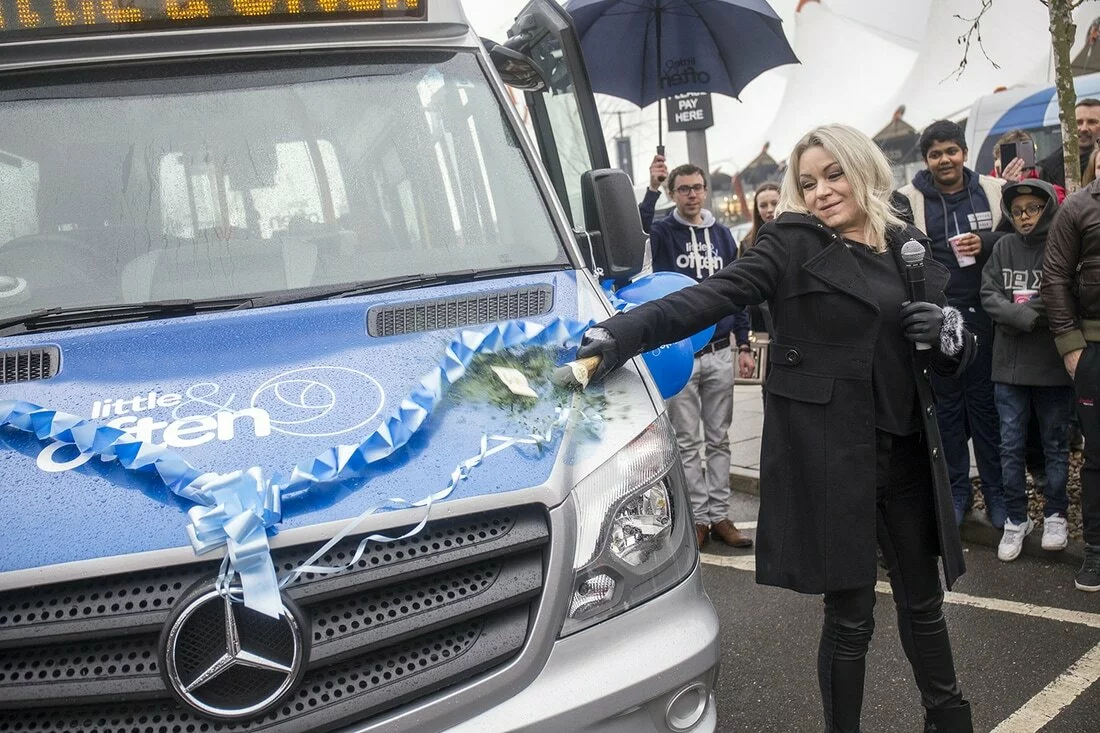 Images (c) Stagecoach South East Images (c) Stagecoach South East
Ashford’s new ‘little & often’ bus fleet got off to a Champagne start on Saturday. Actress Rita Simons, best known for her role as Roxy Mitchell in Eastenders, launched the new service by smashing a bottle of bubbly over one of the new minibuses.
Her appearance drew in crowds to Ashford’s Designer Outlet where the party was hosted by Heart Breakfast radio presenter James Heming. Cabaret dance troupe ‘The Show’ performed a series of modern Charleston dances and there were giveaways and competition prizes. Over 300 cupcakes and 1,000 goodie bags were given away on the day. Several lucky competition winners were picked by James with the first winner announced by Rita. The following have each won a week’s free travel in Ashford; Susan Phillips, Lexie - Mai Anderson, Eleanor Crook, Michael Baker, Brian East, Angela Brown, Isaac Rai and Martin Padgham. Speaking at the launch Ashford MP Damian Green said “I warmly welcome this imaginative scheme. Buses are too often forgotten as one of the best ways to provide public transport, and this should increase bus usage around Ashford. I hope these new routes catch on quickly.” The new turn-up-and-go service began operating on Sunday with buses every five to six minutes on routes B and C, connecting the town centre/rail station with Kennington, Park Farm and the William Harvey Hospital. High-tech ticket machines also allow customers to pay using contactless credit or debit cards – the first to do so in the south east region. Direct Rail Services takes delivery of first Class 88 'dual-mode' locomotive6/2/2017 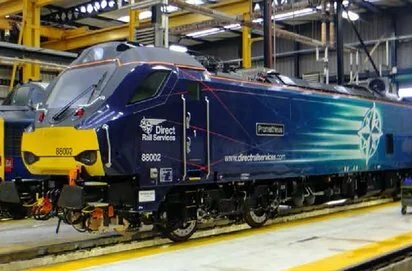
Direct Rail Services’ (DRS) has announced that its’ Class 88 dual mode locomotive 88002, named ‘Prometheus’, is the first to arrive from Stadler, Valencia.
Ten Class 88 locomotives have been ordered by DRS from Stadler Rail, in partnership with Beacon Rail Leasing Limited. The locomotive will be commissioned by Stadler, followed by a UK testing programme which will last six to eight weeks. The remaining nine locomotives will arrive via the Port of Workington by mid-spring. The Class 88 is a true “Dual Mode” locomotive combining both 25kv Electric and Diesel Electric operating modes. A further development of the Class 68 platform, the Class 88 is another technical innovation from Direct Rail Services, providing superior traction equipment for UK operation. The first opportunity to be up close with the locomotive will be at the Direct Rail Services Charity Open Day on July 22nd. Municipal bus operators reduced as Swindon Council sells Thamesdown Transport to Go Ahead3/2/2017 
The number of municipal bus companies has been reduced by one following the sale of Swindon-based Thamesdown Transport to Go South Coast, part of the Go Ahead Group for an undisclosed sum. The sale was ratified at a closed council meeting on February 1st and Go Ahead took over operations from this morning (February 3rd).
The Go Ahead Group-owned firm operates a number of south coast bus and coach companies. The council confirmed that Thamesdown Transport has incurred losses over the past five years due to difficult trading conditions, despite continued financial support from the Council. A statement from Swindon Borough Council said: “With the Council also facing challenging financial pressures of its own, a review of the bus company concluded that the sale of Thamesdown Transport to an established operator would be in the best interest of council taxpayers, Thamesdown’s staff and its customers. “Following a competitive process Go South Coast’s bid was assessed as offering the best value to the Council, which wholly owns the company. The offer from Go South Coast, the terms of which are commercially confidential, was for all the Council’s shares and the freehold of Thamesdown’s Barnfield depot. Cllr David Renard, Leader of Swindon Borough Council, said: “We were one of the few local authorities in the country to still own a local bus company, but the Council is operating in a really challenging financial climate at the moment and we do not have the resources to continue to support Thamesdown Transport as we have been doing in recent years. “We have had to change the way we provide services across the Council while balancing the ever increasing demand on adults’ and children’s services. “We believe this deal is in the best interests of local bus users as it secures the financial sustainability of the bus company, offers the best long-term security for Thamesdown Transport’s employees, and will provide vital investment. Go South Coast’s expertise will also ensure customers continue to benefit from a high quality bus service”. “This is an excellent opportunity for us to develop the services on offer to local people here in Swindon and north Wiltshire,” said Go South Coast managing director, Andrew Wickham. “We’re keen to point out that it’s business as usual as far as our customers are concerned. Any tickets or passes they have will still be valid, and our 85 buses will continue to serve existing routes with no change to timings. “That said, our ultimate aim is to enhance the services on offer here. As part of this, we will be consulting with local people and listening to the needs of those who travel on our buses. Our team will be engaging with representatives of local bus users about our plans to invest in local services. “We are excited to be providing vital sustainable transport in this region, and I have no doubt our talented team will make a complete success of our new venture. “I look forward to meeting with our local customers and hearing their views over the coming weeks and months. The firm has appointed Alex Chutter, currently operations manager at sister company Salisbury Reds, to take the reins at Thamesdown as General Manager. Former Thamesdown Transport Managing Director Paul Jenkins has left the business. New look planned for West Midlands rail services1/2/2017 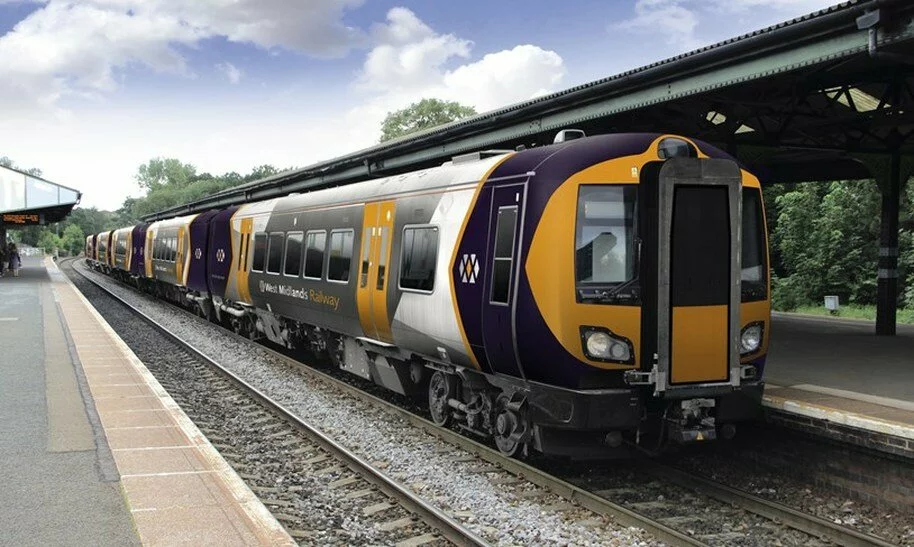
West Midlands Rail (WMR) has released details of how commuter trains in the West Midlands could look when management of the regional network is put into local hands later this year.
The new livery has been unveiled by West Midlands Rail (WMR), a consortium of 14 local authorities which together with the Department for Transport (DfT) will jointly manage the local network from October this year. Management of rail services in the West Midlands is currently the sole responsibility of central government. The dedicated livery would replace the green London Midland colours currently in use. Two train companies, Abellio and Govia, are bidding for the eight-year franchise to run local services on behalf of WMR and DfT. The finer details of the new livery will be agreed with the franchise winner but the design is expected to be closely modelled on the recently released image. Cllr Mark Winnington, chair of WMR and Staffordshire County Council's cabinet member for economic growth, said: "We felt it was important to have a distinct brand and identity for local trains and we are extremely pleased the DfT feels the same way. ""We believe that having this level of involvement in the management of our local network will bring real benefits not just for passengers but also for local businesses. "It means we can help ensure we have a network that can support economic growth and it is for these reasons that the local authorities of the wider West Midlands have come together on this." Improvements for passengers set to be delivered under the new franchise include extra capacity, more frequent services and free Wi-Fi. The enhancements have been included in the Invitation to Tender document which sets out the minimum specifications that need to be met by whichever train operator wins the franchise. One major improvement will be an increase in Sunday services to the same level of frequency currently seen on Saturdays. This will apply to nearly all local routes and together with more evening services is aimed at better reflecting modern working and leisure patterns. The increases, along with a doubling of the off-peak services provided by the franchise between Birmingham and Shrewsbury and a new, direct peak-time service between Walsall and London are among a number of enhancements resulting from WMR's influence in the design of the new franchise. However, the bidding train companies are being encouraged to include proposals for additional benefits over and above the minimum requirements already set out. At last an overhaul of rail fares, but it’s only a trial! So what do the plans mean?1/2/2017 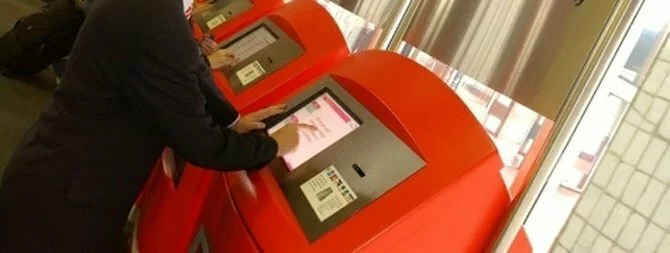
There is no doubt that rail fares are both complex and confusing. Many of the fares currently available are based on historic routing. Whilst new fares are ‘easily’ added to the fares database there is little incentive for train operators to remove some of the archaic fares that are seldom, if ever, sold. There needs to be a massive clear up of the fares database, but what we have is a trial which by implication will look at a very small selection of fares and journeys.
Train operators will spout about the large number of what they call ‘value for money’ advance fares available, but they aren’t convenient in terms of times of availability for everyone. It is really only in the last four years since leaving the railway that I have really appreciated the real cost of rail travel. Having spent 12 years in the industry enjoying free and discounted travel and the best part of 12 years before that as a journalist where free tickets were aplenty. Indeed some specialist journalists still enjoy free travel with unlimited passes, which one operator put a value of over £25k a year on. I personally now accept that if you get free or discounted rail travel it is difficult to understand the complexities of the fares system for rail users who are having to pay full whack. I certainly didn’t but can tell you I do now. So, when planning my travel I now look for the cheapest option and have to say that I am a great advocate of split ticketing - breaking a journey into separate smaller legs, although of course you stay on the same train and in the same seat. You can even save money by using split ticketing with the cheaper advance tickets. I estimate over the last few years I have probably saved approaching £1,000 by using split ticketing. Then there is the case on some routes where a seven day season ticket costs less than two anytime return journeys, so if travelling over a route for just two days a seven day ticket saves money. So in my view, the rail fares system need an upgrade and its needs it now. Yes, a trial is a start but the industry and the Department for Transport must ensure that the trial is reviewed in real time and any recommendations are dealt with promptly. But that could cause other issues. It is quite probable that any changes to rail fares will result in a reduction of farebox income to the train operators. That will affect the business plans and revenue projections of the franchised train operators. Given the franchises are based on very tight financial plans it could mean that the taxpayer will end up paying the cost of a fares review. So back to the trial, what will it mean. The Rail Delivery Group says that passengers on trains between London and Sheffield or Scotland will be among the first to benefit from an overhaul of rail fare regulations as part of the tests agreed between train companies and the government and attention is also to be focused on ticket machines to make then more user-friendly and give customers better information and make it simpler to find the right ticket at the right price. The trials are due to start in May this year on selected routes will comprise new pricing and simpler route options to give customers clearer choices, whilst unnecessary and unwanted fares in the ticketing system will be removed. The RDG says the trials to simplify the complex rail fares system will mean: A route will be overhauled to reflect what is actually on offer, ending the existing situation where changes to train services in many cases only allow fares to be added to the system rather than older, less relevant routes which customers do not use being removed from the fares system to make it clearer; A best value end-to-end ‘through fare’ will be offered for test journeys where customers change trains, by offering one price combining the cheapest fare for each leg of the journey. Current rules require operators to set and maintain a through price even where there are cheaper deals; Easier journey planning by showing customers the best price in each direction on selected routes, allowing customers to mix and match the best fare - like airline bookings. This requires changes to regulated return fares dating back to the 1980s that can’t be sold easily online, giving customers much more clarity and simplicity. A ten-point plan and design guidelines for ticket machines include getting rid of jargon, informing customers when a machine will start to sell cheaper off-peak tickets and making clear what types of tickets machines do and do not sell. All the improvements to ticket machines will be in place by the end of this year, several by the summer. Jacqueline Starr, RDG Managing Director of Customer Experience, said: “We know customers can find it hard to get the right ticket for their journey due to complex rules and regulations built up by governments over decades. There are more than 16million different train fares, many of which nobody buys. This also makes it more difficult to give passengers the right, simple options on ticket machines. “Working with government, we’re determined to overhaul the system to cut out red-tape, jargon and complication to make it easier for customers to buy fares they can trust, including from ticket machines.” The trials will be designed to establish the changes needed to regulation and processes so that train companies can offer customers simpler, easy to use fares. Decades-old government rules covering rail fares, originally intended to protect customers but introduced before the internet and online booking, have prevented train companies from being more flexible in offering tickets that customers want. The changes will build upon improvements already being made to give customers better information – particularly for those buying online or from ticket machines - and more confidence that the tickets they are buying are right for their journeys, making it clear when and where they are valid. Train companies have worked with the government and consumer groups to agree an action plan to help passengers choose the best deal on fares (document can be downloaded below). The trials will focus on three typical examples of the need to modernise rail fares regulations, where they create confusion and show too many different fares: Routeing changes will be tested between London and Sheffield where regulations date back to when the direct service was much less frequent and journeys often needed a change of train via a longer route. This means that tickets are required to be available which are not in step with actual options available now. Best-price through fares will be tested with CrossCountry Trains who are obliged currently by regulations to price through tickets for very long connecting journeys even where customers can beat that price by combining different types of ticket (so-called ‘split ticketing’). Train companies want to remove these expensive, obsolete through fares which in many cases nobody buys but are required by regulations which pre-date the internet and online booking. Single-leg pricing will be tested on the London-Glasgow and London-Edinburgh routes so that customers would always know the cheapest fare for their chosen journey, out and back. Despite train companies making online booking easier, finding the best price both ways is made harder because the regulated off-peak fare is a return fare, therefore customers are often left to calculate whether two single tickets are cheaper than a return. Regulations were designed to protect customers’ interests but now actively create confusion on websites and ticket machines. Train companies want to work with the government to discuss how the system can be updated so that consumer protection underpins giving people fares they really need - not just those on sale since 1995. General Secretary of the RMT union Mick Cash said; "This is an open admission by Britain's private train companies and the Government that they have been ripping off the travelling public for over two decades. "If we want a fair deal on fares then that means keeping ticket offices open, keeping staff on the stations and platforms and nationalising our railways into one publicly owned body with one pricing structure. "The proposals from the train companies today are just pure window dressing from the same old racketeers who have been plundering our railways since privatisation."
|
Steven KnightSteven Knight is a Transport Specialist who has over 40 years experience in the bus and rail industries as well as in specialist transport journalism. He is a member of the Chartered Institute of Journalists. ArchivesJanuary 2021 |
||||||
 Create your own unique website with customizable templates.
Create your own unique website with customizable templates.
- Home Page
- Fleet News Ramblings
- SKM News Views & Blog
- Behind The Picture
- Contact us

